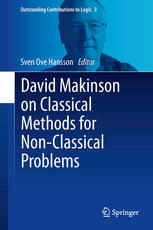

Most ebook files are in PDF format, so you can easily read them using various software such as Foxit Reader or directly on the Google Chrome browser.
Some ebook files are released by publishers in other formats such as .awz, .mobi, .epub, .fb2, etc. You may need to install specific software to read these formats on mobile/PC, such as Calibre.
Please read the tutorial at this link: https://ebookbell.com/faq
We offer FREE conversion to the popular formats you request; however, this may take some time. Therefore, right after payment, please email us, and we will try to provide the service as quickly as possible.
For some exceptional file formats or broken links (if any), please refrain from opening any disputes. Instead, email us first, and we will try to assist within a maximum of 6 hours.
EbookBell Team

4.7
56 reviewsThe volume analyses and develops David Makinson’s efforts to make classical logic useful outside its most obvious application areas. The book contains chapters that analyse, appraise, or reshape Makinson’s work and chapters that develop themes emerging from his contributions. These are grouped into major areas to which Makinsons has made highly influential contributions and the volume in its entirety is divided into four sections, each devoted to a particular area of logic: belief change, uncertain reasoning, normative systems and the resources of classical logic.
Among the contributions included in the volume, one chapter focuses on the “inferential preferential method”, i.e. the combined use of classical logic and mechanisms of preference and choice and provides examples from Makinson’s work in non-monotonic and defeasible reasoning and belief revision. One chapter offers a short autobiography by Makinson which details his discovery of modern logic, his travels across continents and reveals his intellectual encounters and inspirations. The chapter also contains an unusually explicit statement on his views on the (limited but important) role of logic in philosophy.